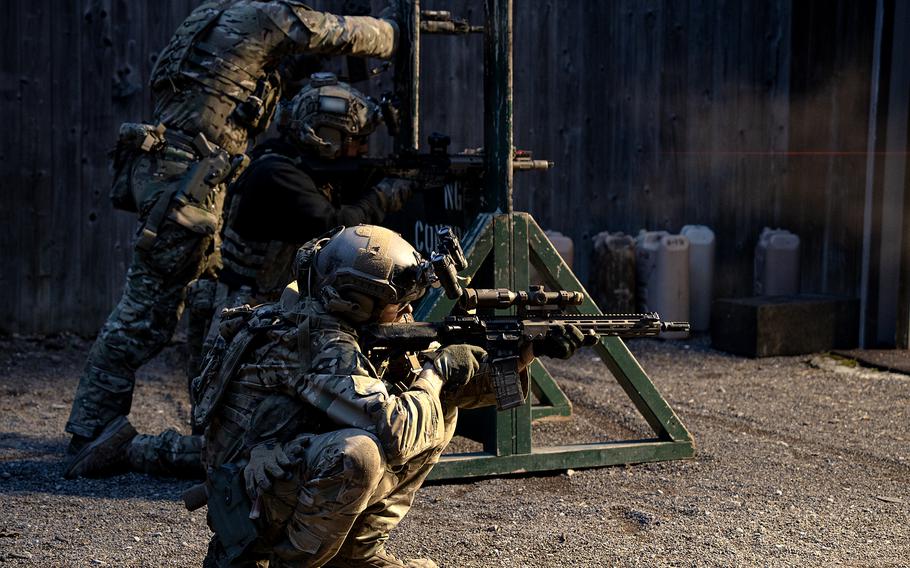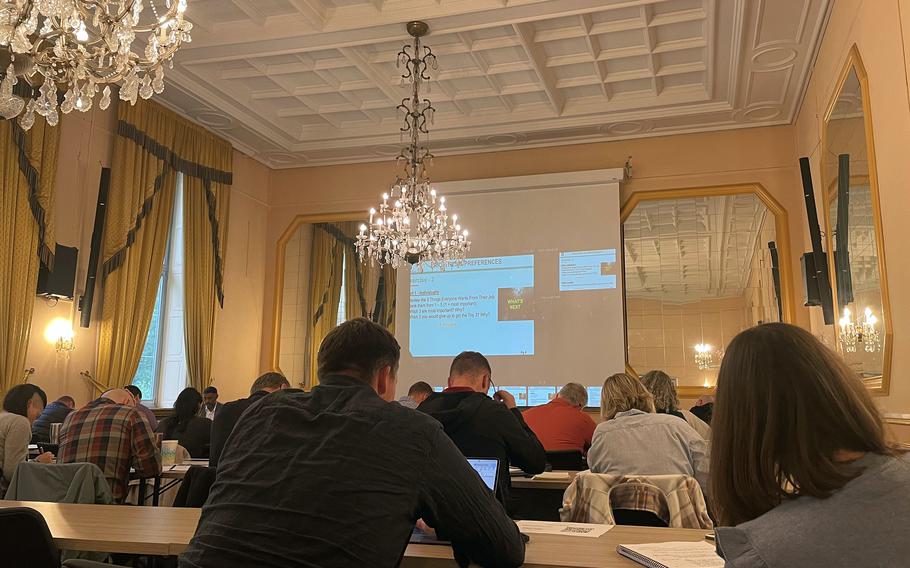
U.S. soldiers assigned to 10th Special Forces Group (Airborne) participate in a combat marksmanship exercise at Panzer Range, in Boeblingen, Germany, Feb. 15, 2024. Special operations troops who are nearing retirement took part this week in seminars to prepare them for civilian life. Years of intense training and combat can make the transition to the civilian world challenging for some troops. (Michele Wiencek/U.S. Army)
STUTTGART, Germany — Leaving the SEAL pack for the wilds of the civilian world was a nerve-racking prospect for the senior enlisted operator, who is on the cusp of leaving the military after a two-decade career.
Within the SEALs, the teams were always close, and carrying out dangerous missions around the world gave a higher purpose to it all, the Stuttgart-based SEAL said Tuesday.
In Stuttgart, the hub for U.S. special operations forces in Europe, dozens of elite troops near the end of their careers gathered this week to take part in seminars designed to help them prepare for what comes next.
“I would say what makes (special operations) unique is the tribe aspect, being part of something that’s very tight-knit,” said Shane, whose last name was withheld for security reasons. “It’s a very homogenous culture and that can have its pros and cons, especially when transitioning to civilian life.”
In the coming years, larger numbers of special operators will be heading into retirement after their ranks sharply increased during the Global War on Terror era.
The switch to civilian life can be more difficult for Special Operations Forces service members because of the years of physical and mental strain, a Government Accountability Office report said in September.
The GAO also said that there were indications elite troops too often put off the Defense Department’s mandatory Transition Assistance Program until the last minute because of operational demands, potentially leaving them ill-prepared for civilian life.
Some nonprofit groups are looking to fill the gaps.
Shane said he’s attended two seminars offered by the Donovan and Bank Foundation, which is focused on helping elite troops adapt to post-military life, and is now feeling less anxious about leaving the service behind.
Arranging a civilian career in security risk management has been challenging while based overseas, he said, but the seminars have helped him build up a network.
“There was a point where I was very nervous, but I think that’s dissipated a little bit more as I’ve done these seminars,” he said. “I think I am better situated now.”
Special operators often say their top concern upon leaving the service is figuring how to translate their skills to the civilian world so those doing the hiring can understand how they can contribute, said former Green Beret Drew Stamp, chief operating officer of the North Carolina-based Donovan and Bank Foundation.

Special operations troops who are nearing retirement took part in seminars Oct. 7 and Oct. 8, 2024, in Stuttgart aimed at helping them prepare for civilian life. Years of intense training and combat can make the transition to the civilian world challenging for some troops. (John Vandiver/Stars and Stripes)
“We’ve had 4,400 people come through our seminars the last three years. The number one word that seems ubiquitous for everybody is ‘translate,’ ” Stamp said.
The broad range of responsibilities that come with being a special operator, whether it’s as a weapons sergeant or a senior officer, works to their advantage. Work in high-stress environments and combat zones showcases a “bias for action” that appeals to the private sector, he said.
But there are equally important issues beyond translating skills that troops need to focus on.
“Addressing the loss of purpose, identity, community, that’s a separate issue (from resume building). So that’s what we’re trying to get ahead of,” Stamp said.
While the military invests heavily in developing special operators, less consideration is given to their exit, he said.
“A lot of the training pipelines for the different SOF operation roles, they’re upwards of 12 to 24 months, so there’s this very robust onboarding. But the offboarding looks the exact same as everybody else,” Stamp said.
Stamp’s organization, in partnership with the Honor Foundation, another group focused on assisting special operators, conducted workshops in Stuttgart on Monday and Tuesday aimed at helping troops plan and prioritize.
Troops with high-achieving mindsets often come out of the military with a goal to get the biggest salary possible but later leave those jobs feeling unsatisfied, Stamp told the special operators.
The corporate culture of a prospective employer needs to be taken into account, and troops need to consider how that culture lines up with their values and priorities, seminar facilitators said.
“You need to interview them as aggressively as they are interviewing you,” said one of the presenters. “Ask all the questions so you know what to expect.”
A Green Beret attending the seminars said one of the takeaways has been the need to bring an open mind to civilian life.
In special operations, you’re surrounded by like-minded go-getters with a tendency to push themselves to their limits, he said. In the civilian workforce, you’re more likely to encounter people with different levels of motivation.
Inside the military, there is a mystique that surrounds the elite forces and a special status given to its operators that’s unlikely to be replicated in civilian life.
The Green Beret, who declined to be named for security reasons, said he’s focused on not tying his identity to the Special Forces tab on his uniform.
“It’s good to be proud of where you come from and the things you’ve done, but realize that’s not all of who you are. A tab is just a tab,” he said.
When he leaves the service, he said he’s looking for work in the nonprofit sector. A full military pension means less pressure to go for the largest paycheck, he said.
“I want to do things that are fulfilling and meaningful and continue to have an impact,” he said. “Just use the same skills and the same drives that I have in a different way.”